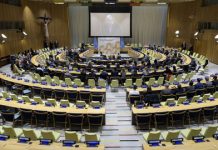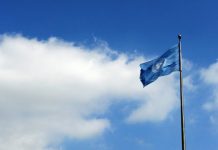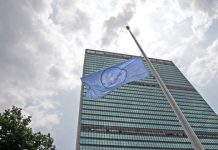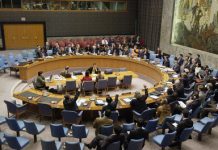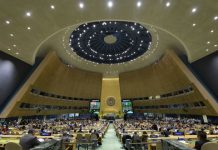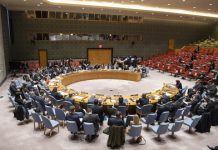Under-Secretary-General for Peace Operations Jean-Pierre Lacroix was joined by Major General Patrick Gauchat, Head of the UN Truce Supervision Organization (UNTSO) who is temporarily in charge of the UN force in the Golan, UNDOF.
Mr. Lacroix is currently in Lebanon, where the UN Interim Force in the country UNIFIL, monitors the Blue Line border of separation with Israel. He is there with the UN Secretary-General and they visited the Mission’s area of operations earlier that day.
Recent hostilities
The peacekeeping chief updated on UNIFIL’s activities as a fragile truce between Lebanon and Israel continues to hold.
The agreement, signed on 27 November 2024, ended more than a year of hostilities between Hezbollah militants and the Israel Defense Forces (IDF), triggered by the Gaza war.
It calls for Israel to withdraw from areas of southern Lebanon within 60 days, and for Lebanese troops to redeploy during this period.
Hezbollah and Israeli forces previously clashed nearly 20 years ago, and the Council adopted Resolution 1701 (2006), which continues to apply today.
Deployments and demolitions
Mr. Lacroix said the Lebanese Armed Forces (LAF) have deployed to 93 locations south of the Litani River as of 15 January, compared with an estimated 10 locations on 27 November, and UNIFIL has supported many of these movements.
He was encouraged to hear that a plan for a carefully sequenced IDF withdrawal and Lebanese redeployment was presented at a meeting of the cessation of hostilities mechanism on 6 January.
“With 10 days until the end of the stated 60-day period for the withdrawal of Israeli forces from Lebanon, however, Israeli demolitions of tunnels, buildings, and agricultural land continue,” he said.
“Some airstrikes have also been reported, as have ongoing violations of Lebanese airspace.”
UNIFIL also continues to detect trajectories of projectiles fired from south to north of the Blue Line, although at a far lower level compared to before the truce.
Withdraw from the region
“Noting that the Israel Defense Forces has stated that its actions are targeting Hezbollah assets and personnel, the continued presence of the Israel Defense Forces in Lebanon is a violation of resolution 1701,” he said.
“We urge the Israel Defense Forces to withdraw from Lebanese territory without delay, certainly by the end of the period envisaged in the announcement of the cessation of hostilities.”
Mr. Lacroix told the Council the past year has clearly demonstrated the significant presence of unauthorized armed personnel, assets and weapons related to Hezbollah and other non-State armed groups south of the Litani – in blatant violation of the UN resolution.
He said the LAF have shown increased resolve in dealing with these in recent weeks. Furthermore, UNIFIL has also located 116 caches of weapons and ammunition, in addition to observing potential tunnels and Hezbollah sites, and informed the LAF for their appropriate action.
“It is vital that such action by Lebanese authorities continues,” he said, adding that the Secretary-General will underscore this message in his meetings with Lebanon’s newly elected President, Speaker of Parliament, and caretaker Prime Minister in Beirut on Saturday.
The UN Interim Force in Lebanon (UNIFIL) is holding its positions in the south, where violence is escalating.
Support for UNIFIL
Mr. Lacroix reported that UNIFIL has been adjusting its posture and operational activities to support the cessation of hostilities, in line with its mandate under resolution 1701.
He expressed hope that with the “new political dynamics” in Lebanon, “more space and political support will be forthcoming to UNIFIL as we move forward, for the Force to fulfill its mandate.”
The Mission’s unrestricted freedom of movement and full access throughout its area of operations are critical to support the full implementation of the resolution, he said.
Yet, seven weeks since the truce, most contingents remain confined to base and occasionally have to seek shelter in bunkers due to nearby IDF military activity or IDF advisories.
Operational activities are further constrained due to the presence of unexploded ordnance, IDF roadblocks, and interference from local people.
“As the IDF has been replying to very few of the Mission’s requests for deconfliction, the Mission has adjusted to a notification system for critical operational and logistics movements,” he said.
‘Reason for optimism’
Mr. Lacroix noted that while challenges remain in Lebanon, “there is reason for optimism coupled with strong determination that there be no return to the past.”
He stressed that confidence in security and stability along the Blue Line is necessary for communities in southern Lebanon and northern Israel.
“The ongoing returns of residents to southern Lebanon will continue as Israeli forces withdraw and as reconstruction efforts gather speed. We note that Israel has also presented a plan for the return of its residents to communities close to the Blue Line, in March 2025,” he said.
He hailed the election of a new President in Lebanon, and the designation of a Prime Minister who will form a new government, as “important steps towards the strengthening of State institutions and the extension of State authority.”
Major General Patrick Gauchat (on screen), Head of the UN Truce Supervision Organization (UNTSO) and Interim Head of UNDOF, briefs the UN Security Council meeting on the situation in Syria.
Peacekeeping activities amid restrictions
Major General Patrick Gauchat emphasised the operational difficulties his mission has encountered in maintaining its mandate amid heightened tensions in the area of separation.
“While UNDOF has had continuous contact with Syrian interlocutors throughout these recent developments, liaison by UNDOF with Syria is impacted,” he explained, noting that efforts are underway to establish stable communication channels with the de facto authorities.
UNDOF peacekeepers, supported by UN Truce Supervision Organization (UNTSO) observers, remain at their pre-December 2024 positions. They continue key tasks such as monitoring the ceasefire line and patrolling the ceasefire line.
The Israel Defense Forces (IDF) have undertaken construction work using heavy equipment and setting up communication in the area of separation as a “temporary defensive measure,” Mr. Gauchat quoted.
UNDOF has informed its Israeli counterparts that their presence and activities in this area violate the 1974 Disengagement of Forces Agreement.
The IDF’s presence and roadblocks have severely impacted UNDOF’s operational capacity, reducing movements from 55 to 60 operations daily to just 10 essential logistics missions.
However, the mission has adapted its approach, increasing weekly patrols from 10 to 40 and addressing urgent safety concerns, such as the neutralisation of unexploded ordnance in public areas.
Local concerns, liaison efforts
Residents of the Golan have expressed concerns to UNDOF, calling for the IDF to leave their villages. Some reported instances of searches and arrests of their relatives.
UNDOF is working to understand and address these grievances through ongoing liaison efforts.
“It is imperative that the UN peacekeepers are allowed to carry out their mandated tasks without obstruction,” Mr. Gauchat stressed, urging all parties to maintain the ceasefire and respect the terms of the 1974 Agreement.
“We count on the continued support of Member States to return to full mandate implementation,” he concluded.
Source of original article: United Nations (news.un.org). Photo credit: UN. The content of this article does not necessarily reflect the views or opinion of Global Diaspora News (www.globaldiasporanews.com).
To submit your press release: (https://www.globaldiasporanews.com/pr).
To advertise on Global Diaspora News: (www.globaldiasporanews.com/ads).
Sign up to Global Diaspora News newsletter (https://www.globaldiasporanews.com/newsletter/) to start receiving updates and opportunities directly in your email inbox for free.




